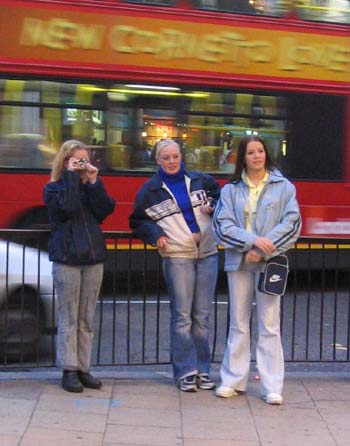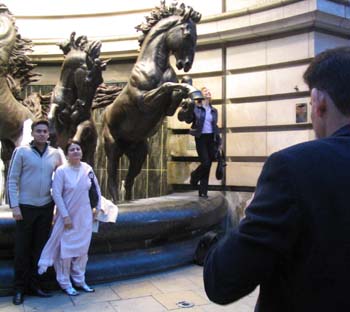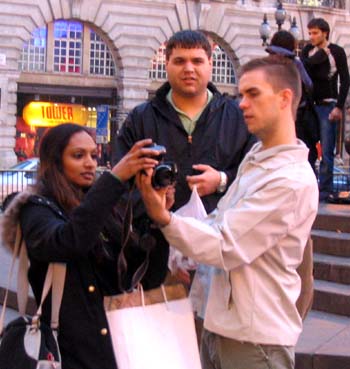We are developing the social individualist meta-context for the future. From the very serious to the extremely frivolous... lets see what is on the mind of the Samizdata people.
Samizdata, derived from Samizdat /n. - a system of clandestine publication of banned literature in the USSR [Russ.,= self-publishing house]
|
Last month, I was in the Sydney Fish Markets with fellow Samizdatista Michael Jennings. We had a splendid lunch, as the Fish Markets have plenty of good places to eat. Anyhow on leaving we grabbed a coffee to go, and headed off back to the tram stop to return to the CBD.
I was tardy in finishing my coffee, and in fact I did not finish it until I had got to the tram stop. So I got up to put the cup in the bin. However, I found to my considerable surprise that the bin had been closed. A plastic lid had been placed over the top of the bin.
I had never seen anything like it in my life. Michael Jennings, though, knew why- he explained that it was the practice to seal such bins to prevent people from placing bombs there, and that this is a common sight in London.
Well, that makes sense. There is a war on, as they used to say.
If truth is the first casualty of war, then libertarian ideals seem to me to be not far behind. In a society under military pressure, the liberty of the individual is quickly appropriated by the State for its own ends, often quite justifiably. The needs of the RAF in England in 1940 really were quite important, after all.
In Australia, the touch is very light. We are rather remote and isolated from the crosscurrents of the War on Terror. But we’ve had experience of this phenomena before, in the Second World War. With the Japanese ‘at the gates’ so to speak, the Federal Government wasted no time in seizing power over large swathes of the liberty of the individual. And, as a libertarian minded individual, if I had protested, the government would have told me “hey, there’s a war on, you know”.
The only Western society that would really understand this these days is Israel, I would guess. Liberty is best enjoyed when you are alive, and sometimes the need of the latter have to take precedence over the former.
I think though, that it is no coincidence that the necessary loss of personal liberty in both Australia and Britain in the second world war acclimatised the citizens for the massive assault on personal liberty and responsibility that came straight after the war, when socialist governments in both nations erected all-embracing welfare states.
Not that they saw it that way at the time – it was seen as a ‘just reward’ for the people who had endured the costs of war. It turned out to be a false reward indeed, but the idea that there really is no such thing as a free lunch took thirty five years to sink into the minds of the electorates in both nations. (Indeed, it is arguable that it has not penetrated even now).
The lesson is clear though – the state will use the loss of liberties necessary to undertake the war on terror to its own advantage, and we must be vigilant to prevent a second welfare state disaster being built on the back of it.
Yes, so far it is just a rubbish bin. Let us keep it that way.

However badly the war on terror infringes our liberty,
there are at least appropriate ways in which
we can deal with the Wasabi strain of Islam.
Nigel Meek, contibuting to the Libertarian Alliance Forum, translates the first paragraph of a Swissinfo news story from its original French, thus:
Hungarian researchers have announced the discovery of a remedy for hay fever. “Rhinolight”, a natural therapy, comprises the direction of “specific light” on the mucous membrane according to specialists at the University of Szeged.
What exactly might “specific light” mean, in this context? And is “Rhinolight” some kind of brand name, or is it a technical term? And: “natural therapy”. In Britain that sounds like: will not work.
But, if this report turns out to be true, I agree with Nigel’s comment:
Hooray!
Indeed. Nigel is a hay fever sufferer himself, as I have so far not been. But I am always pleased about creative, helpful, basically good news stories such as these. The other side, it seems to me, to stories along the lines of “here are some politicians and they have just done/presided over/caused something idiotic/cruel/destructive this” is not: “oh no they haven’t”, or maybe: “well here are some other politicians who are doing better. It is: “well maybe the politicians are making a mess, but there is also good stuff happening in the world being done by quite other people.”
Any comments on this, either from people with better French than me (not very hard), or with better medical science (even easier)? And, is there any news of this that we can read about in English?
UPDATE: Commenter number one reveals that “Rhinolight” is a brand name, and says: here is the link. But the other question still remains: Is this treatment any use?
A free public meeting is being held in London next week to discuss the Government’s Identity Card plans. A number of high profile figures will be speaking at this important meeting, so if you’re in London try to get along. Let’s show Big Blunkett and the media that there is massive public resistance to this scheme.
More details and registration information at:
Mistaken Identity
I put up one pissy blog post about how there is no hope for liberty in the American political arena, and next thing you know I see this:
A group of libertarian-minded Republicans in Congress is blocking President Bush’s effort to strengthen domestic counterterrorism laws and reauthorize the USA Patriot Act, which the president has made one of his top domestic priorities this year.
Kind of a good news/bad news thing. Good that there is some opposition to the Patriot Act, which is odious in a number of ways, bad that Bush has made extending it his top domestic priority this year. Legislation is apparently gaining ground that would rein in some of the worst bits of the Patriot Act, although apparently Bush has threatened to veto anything of the sort. I should note that the lead paragraph above is a little misleading; Democrats are carrying more than their fair share of the load on this front.
Bush, who has not vetoed a single bill in his entire Presidency (a record, I believe), would single out a bill protecting civil liberties for veto. I happen to think that, from a broad strategic perspective, the Bush administration has gotten a lot right in the current war. However, they seem to be doing everything they can on the domestic front to encourage me to stay home in November.
The Independent reports that Blair is planning a short autumn session of Parliament. This is to allow a clear run to next year’s General Election.
In the limited time available, Blair has reportedly asked Ministers to prioritise two Bills: The Europe Bill and Big Blunkett’s discredited ID Card Bill.
So expect every political trick in the book to be used to get the Bill through both Houses with a minimum of reasoned debate.
It is often said that rushed legislation is bad legislation. When legislation starts out as badly as Blunkett’s ID Card scheme and is then rushed it can only get worse.
The imposition of ID Cards on innocent British citizens is a major constitutional change for which the Government has no mandate. Any vote on such a controversial issue must be a free vote.
To rush it through Parliament in this way would be an insult not just to the British public but also to democracy.
Cross-posted from The Chestnut Tree Cafe
Rather like Robert Clayton Dean in America, when I cast my libertarian eye at the Australian political scene, I find little reason to cheer. Australia is due to have a Federal election this year, although the exact date is at the pleasure of the Prime Minister. So election date speculation abounds, with some saying in August and others saying October.
The government here is dominated by the old line ‘conservative’ John Howard, who is basically a right-wing statist. In power since 1996, after a moderately good start at cutting back the state, the government has been in decline ever since and is now a menace, wandering through society causing havoc wherever it goes.
As it happens, last night was Budget night, where the government gives its annual account of its rapine and pillage of our wallets. With the election looming, this is a classic ‘tax-cut and spend’ pre-election budget, although the ‘cuts’ to taxes are not really cuts at all, but mere adjustments of the brackets. Therefore, you have a chance to earn ‘slightly’ more money before the government decides that half of your income belongs to them.
If London readers wonder why their city is full of very clever Australians, that is one of the bigger reasons why.
This is, by the way, the supposedly ‘free market’ party in power. It will in all probability be replaced by Mark Latham and his Australian Labour Party. On economic issues there is very little difference between the two parties, just a disagreement about where to splurge the tax-take on. I can only echo what Mr. Dean said in his survey of his own country’s political scene-as it is, one simply despairs of advancing the libertarian agenda in current Australian politics.
I just found out about the latest Al-Qaeda beheading. I haven’t seen the video. Probably I never will.
I thought of Daniel Pearl. I wondered how and when the murdered man’s family learned of the manner of their son’s death. I wondered if he himself knew what was about to happen, as Fabrizio Quattrocchi did.
And such is the unalterably tactical nature of the human mind that mixed in with all that I thought:
Thanks for the reminder, Hellspawn. No thanks for the killing; we’ve had enough of that, but thanks for the reminder. In all this agonized talk about what we are, we were beginning to forget what you are. What you stand for.
What your pictures show.
Andrew Sullivan thought the same way, evidently:
And they [Al-Qaeda] are as stupid as they are evil. Iraqis now have contrasting images. Do they want to be run by people who cut innocent people’s throats at will or by people who have removed a dictator and are investigating unethical abuse of prison inmates? Zarqawi has now done something for our morale as well as his. He has reminded us of the real enemy; and he has reminded the Iraqis. One simple question: will CNN now show these video stills?
Well trade here seems to be rather light, so here, given that writing adequately is beyond me just now, are some photos I took earlier. Earlier this evening to be exact. The light was fading fast, but a few of my snaps came out okay.
I like the effect you get when the background is a London bus. Lots of colour, but blurred, and if the figures in the foreground come out well, it can look great.
As you can see, I like to take pictures of people who are taking pictures. Sometimes, as here, I include the people they are photographing. And look, over on the right is a lady posing for another photographer away to the right. I only noticed her after I got home. The horses are a big fountain statue just to the edge of Piccadilly Circus, and are, I think, much more impressive than Eros.
This next bunch of people are doing a characteristic digital camera thing which Real Photographers never do. They are looking together at the picture they have just taken on that little TV type screen that digital cameras mostly now have.
But now here is a shot of London life of a quite different sort. The London Underground is a creeking, groaning, deafeningly loud, hideously crowded … Underground. But they are amazingly quick to put up the posters about any problems they are having.
When I see posters like these, I am part angry, and part impressed. Such a fuck up, and so courteously explained!
I cannot end on this grim note, so here is a happier Underground related picture, this time of a Coca Cola advert done in the lights of Piccadilly Circus, which are supposedly famous, but usually rather feeble, I think. But this was nice. This picture is probably too small, but trust me, it looked very fine.
London. As Doctor Johnson said, if you are tired of London, go to bed and get yourself a good night’s sleep and you will probably feel much better in the morning.
Belatedly, but no less relevantly, I was directed to the following Letter to Editor published in the Daily Telegraph last Saturday. It is from a British Army officer who was (still is?) in Basra. Its content was heartily approved by the Samizdata’s own Our Man in Basra – his quotable comment was I could have written every word myself…
Sir, I am a serving Army officer. Publication of photographs that are faked – as appears to be the growing consensus – does not assist our soldiers on the ground but, while such abuse is intolerable to us, brutalised Iraqi opinion differs from ours. Most Iraqis are baffled as to why we do not employ such methods.
Suggestions I have encountered while working with Iraqi governance institutions in Basrah include: crushing looters’ hands, wiring pylon saboteurs to the national grid and hanging rioters by the neck and beating them to death.
In Iraqi eyes, it is not through torture that we have failed Iraq. One year on from liberation, improvements have not materialised. We still seek military solutions to problems caused by policy. The Coalition Provisional Authority (CPA) inherited and perpetuated a Soviet-style centralised bureaucracy without the clear central direction or the threats to back it up that made the Ba’athist system work.
Poor salary decisions mean that operating budgets cannot be paid, so, while there are new police cars, they have no fuel and Iraqi jails lack money for food.
On March 13, after nine months of operations, the Rapid Regional Response Programme, the CPA’s principal project fund for improving Iraqi life had, in the South, identified almost $42 million (£23.5 million) of projects but, owing to excessively bureaucratic contracting, completed only a shameful $627,671 worth. Emergency Infrastructure Project funding achieved more, but millions of dollars worth of projects will not be completed when the June deadline expires.
Yet many Iraqis will endure all this for freedom and democracy. In terms of freedom, Iraqis are still arrested, held indefinitely without trial and, apparently, tortured. In terms of democracy, the CPA, fearing calls for national elections in which Islamic parties may succeed, has banned direct, democratic elections in favour of caucus-style selections derided as undemocratic by most Iraqis.
Meanwhile, those such as Moqtada al-Sadr, the rogue cleric regarded by most Iraqis as a foolish upstart whose lack of support would be revealed by polling, terrorise the country with armed militias. Next month, the CPA will hand over sovereignty and responsibility to an Iraqi nation singularly unequipped to cope.
Iraqis I have spoken to confirm that ousting Saddam was the right thing to do, but if overturning unpleasant regimes is to become a regular feature of foreign policy, we should ensure we have something better to replace them with.
In short, cherchez le politicien.
One casts far and wide for any ray of hope in current domestic American politics. The Bush campaign is depressingly, although perhaps wisely, silent on any of the quasi-libertarian Republican issues – gun control, deregulation, privatization of Social Security, tax cuts. As for the Bush record, well, if the rhetoric is depressing (he stated he would sign an extension of the moronic assault weapon ban), the reality is even worse, in the form of a spending binge beyond all precedent or belief. I note the sole exception of Bush’s rather anemic and backloaded tax cut, much of which is self-repealing.
The Democrats, predictably, are even worse. Their only real complaints concerning current domestic policy are fiscal – that spending wasn’t increased even more, and that taxes weren’t raised to pay for all that spending. Sure, you can catch the occasional Dem kvetching about such issues as tort reform or environmental deregulation, but those are dogs that are notable because they are not barking. There is no tort reform, there is no lightening of the regulatory burden. Democratic joke candidate Kerry floats the occasional trial balloon concerning a targeted corporate tax cut or Social Security privatization, but you know that is only so Senator Flippy can say he was for them before he was against them.
There is, in short, no evidence to be found in either major party that limited government and individual freedom (aside from the freedom to have an abortion, of course) have any place in the modern US of A. If it wasn’t for the fact that the best thing that could happen to the libertarian movement in the US would be to launch the entire current Libertarian Party into the sun, I would vote Libertarian. As it is, one simply despairs of advancing the libertarian agenda in current US politics.
Long eyelashes and watery eyes could thwart iris scanning technology used for the government’s ID card trial. An MP who volunteered to take part in the trial at the UK Passport Service headquarters in London complained the scanning was uncomfortable.
Home Affairs Select Committee member Bob Russell, who suffers from an eye complaint, said his eyes watered and staff were unable to scan his iris. Project director Roland Sables told MPs:
The pundits tell us that we should expect 7% across the board to fail with iris recognition, mainly due to positioning in front of the camera. Others are due to eye malformations, watery eyes and long eyelashes in a small percentage.
Hard contact lenses could also prove problematic. Mr Russell expressed concern about the scanning after his experience.
I think this is going to cause serious problems for people who suffer with bright lights and people with epilepsy. I think it will be necessary at every machine to have at least one member of staff who is a qualified first aider to a high level. I can see people keeling over with epileptic fits.
People with faint fingerprints would also be unable to register on the system, as would manual labourers, particularly those who work with cement or shuffle paper regularly, Mr Sables told the MPs.
The Plan is that by 2013, 80% of the population are expected to have a biometric passport or driving licence, at which point the government will decide whether to make the ID cards compulsory. The remaining 20% are presumably construction workers with long eyelashes, wearing hard contact lenses and suffering from epileptic fits…
Here is the answer to my question in the final paragraph of my earlier post about the treatement of Iraqi detainees in the Abu Ghraib prison:
On 31 January 2004, the Commander, CFLCC, appointed MG Antonio M. Taguba, Deputy Commanding General Support, CFLCC, to conduct this investigation. MG Taguba was directed to conduct an informal investigation under AR 15-6 into the 800th MP Brigade’s detention and internment operations. Specifically, MG Taguba was tasked to:
a. (U)Inquire into all the facts and circumstances surrounding recent allegations of detainee abuse, specifically allegations of maltreatment at the Abu Ghraib Prison (Baghdad Central Confinement Facility (BCCF));
b. (U) Inquire into detainee escapes and accountability lapses as reported by CJTF-7, specifically allegations concerning these events at the Abu Ghraib Prison;
c. (U) Investigate the training, standards, employment, command policies, internal procedures, and command climate in the 800th MP Brigade, as appropriate;
d. (U) Make specific findings of fact concerning all aspects of the investigation, and make any recommendations for corrective action, as appropriate. (ANNEX 4)
These were the findings:
(U) The US Army Criminal Investigation Command (CID), led by COL Jerry Mocello, and a team of highly trained professional agents have done a superb job of investigating several complex and extremely disturbing incidents of detainee abuse at the Abu Ghraib Prison. They conducted over 50 interviews of witnesses, potential criminal suspects, and detainees. They also uncovered numerous photos and videos portraying in graphic detail detainee abuse by Military Police personnel on numerous occasions from October to December 2003. Several potential suspects rendered full and complete confessions regarding their personal involvement and the involvement of fellow Soldiers in this abuse. Several potential suspects invoked their rights under Article 31 of the Uniform Code of Military Justice (UCMJ) and the 5th Amendment of the U.S. Constitution. (ANNEX 25)
→ Continue reading: A very long report
|
Who Are We? The Samizdata people are a bunch of sinister and heavily armed globalist illuminati who seek to infect the entire world with the values of personal liberty and several property. Amongst our many crimes is a sense of humour and the intermittent use of British spelling.
We are also a varied group made up of social individualists, classical liberals, whigs, libertarians, extropians, futurists, ‘Porcupines’, Karl Popper fetishists, recovering neo-conservatives, crazed Ayn Rand worshipers, over-caffeinated Virginia Postrel devotees, witty Frédéric Bastiat wannabes, cypherpunks, minarchists, kritarchists and wild-eyed anarcho-capitalists from Britain, North America, Australia and Europe.
|








